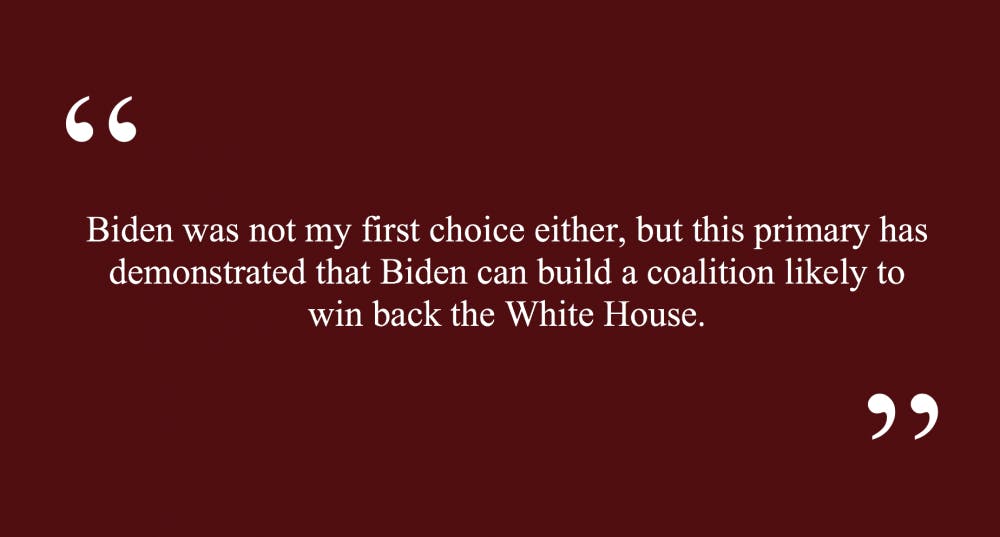As soon as former Vice President Joseph R. Biden Jr.’s triumph on Super Tuesday became apparent, progressives at Brown and online began bemoaning the result. Once again, the Democrats were running a boring centrist who was certain to lose to current President Donald Trump. Once again, they were conspiring to undermine the candidate who actually had a chance of winning, because they were afraid he would disrupt the status quo. And once again, Democrats had chosen a Hillary Clinton type — because that worked so well the last time. While the comparison between 2016 Presidential Candidate Hillary Clinton and Biden seems obvious, it is inaccurate and ignores Biden’s very good chance of winning the election.
To be sure, Biden is far from a perfect candidate. In fact, I am slightly more aligned on policy with Sen. Bernie Sanders. I agree with his progressive plans to fight climate change, reform the criminal justice system and place a far greater tax burden on the highest earners in this country. But like many Democratic primary voters interviewed in exit polls this primary season, I think it’s more important to choose a candidate who will beat Trump than a candidate whom I agree with on the issues.
And with each passing primary, it becomes clearer that that candidate is Biden.
Biden’s electability lies in his ability to capture key votes from people who were not willing to support Clinton in 2016. This is the same coalition of voters that propelled former President Barack Obama to victory in 2008 and 2012. Clinton failed to inspire Black voters, whose turnout fell for the first time in 20 years during the last election. She was also less successful than Obama in narrowing the gap in voter turnout between suburban Republicans and Democrats. White people without college degrees turned out overwhelmingly for Trump, a group Clinton needed to win.
Combined, a lack of votes from these three groups destroyed Clinton, particularly in the Rust Belt. But Biden has already shown strength in that voting block. In Virginia, which is rapidly transitioning from a swing state to a blue state, Biden gained 200,000 more votes than Clinton, mostly due to record-breaking turnout in the suburbs and among African Americans. And in Michigan, a key battleground state, turnout increased by 25 percent, with Biden winning by over 15 percentage points. Among white voters without college degrees, Clinton lost to Sanders in the 2016 Michigan Primary by 15 percentage points and in Missouri by 5 percentage points. Biden won this group in Michigan by 11 percentage points and in Missouri by 18 percentage points. And on Super Tuesday, in states where exit polling was conducted, he won three times as many states’ non-college educated white populations as Sanders.
This suggests that many Rust Belt voters who supported Bernie in 2016 did so not because they supported Bernie, but because they did not support Clinton. Those same people were more willing to vote against Clinton in the general as well. But Biden doesn’t inspire that same kind of vitriol, as evidenced by his current +0.5 Real Clear Politics net favorability rating — compared to Clinton’s March 2016 rating of -12. This favorability indicates that he is a far more palatable candidate among key constituencies that could decide the general election.
Biden is not only motivating voters who weren’t won over by Clinton in 2016; he’s also bringing in new voters. Analysis by the Washington Post found that Biden has won nearly 60 percent of primary voters who didn’t vote in 2016. Sanders’ electability argument hinges on motivated young people turning out in record numbers, which hasn’t happened in recent years. As The Herald previously reported, student turnout from Brown tripled from 2014 to 2018 — to 45 percent. In other words, even highly educated young people who are constantly talking about politics just don’t vote all that often. Banking an election on us suddenly turning out is a recipe for loss.
I understand why many progressives at Brown are mourning the demise of Sanders’ and Warren’s campaigns. Biden was not my first choice either, but this primary has demonstrated that Biden can build a coalition likely to win back the White House. Perhaps this is why he’s currently leading Trump in head-to-head polls in key states like Michigan, Pennsylvania and Arizona. And his effect on down-ballot races cannot be ignored; in almost all the states with competitive Senate races (Arizona, Maine, North Carolina, Michigan, Georgia), Biden won the primary, and as soon as he won Super Tuesday, Gov. Steve Bullock, the only Democrat who could conceivably win the Montana Senate race, announced he was running. Biden can and should be criticized for past and current stances, some egregious. But to claim that he is Clinton’s twin, and thus likely to lose to Trump, completely ignores his wide-scale support among Democrats, particularly with key constituencies — Black, suburban, white and working-class voters. Clinton lost by nearly 80,000 votes across Michigan, Pennsylvania, and Wisconsin in 2016, thus losing the election. Biden has won those votes once, and he can do it again against Trump in November.
Caleb Apple ’21 can be reached at caleb_apple@brown.edu. Please send responses to this opinion to letters@browndailyherald.com and op-eds to opinions@browndailyherald.com.

ADVERTISEMENT




